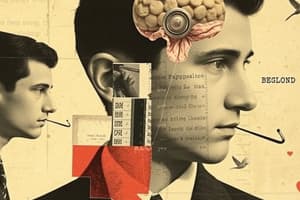Podcast
Questions and Answers
What is classical conditioning?
What is classical conditioning?
Classical conditioning involves the repeated pairing of a neutral stimulus with an unconditioned stimulus to produce a conditioned response.
What is a stimulus?
What is a stimulus?
A stimulus is an external event that affects an individual's behavior or response.
What is an unconditioned stimulus?
What is an unconditioned stimulus?
An unconditioned stimulus is a stimulus that triggers an unconditioned response.
What is an unconditioned response?
What is an unconditioned response?
Who is considered the father of classical conditioning?
Who is considered the father of classical conditioning?
What was the main idea of Ivan Pavlov's experiment?
What was the main idea of Ivan Pavlov's experiment?
What is the difference between classical and operant conditioning?
What is the difference between classical and operant conditioning?
What is operant conditioning?
What is operant conditioning?
What is social cognitive theory?
What is social cognitive theory?
What is observational learning?
What is observational learning?
What is required for an individual to imitate a behavior?
What is required for an individual to imitate a behavior?
What does ecological systems theory provide?
What does ecological systems theory provide?
What is self-efficacy?
What is self-efficacy?
What factors affect children's behavior according to sociocultural theory?
What factors affect children's behavior according to sociocultural theory?
Who is Vygotsky?
Who is Vygotsky?
Flashcards are hidden until you start studying
Study Notes
Classical Conditioning
- Classical conditioning involves pairing a neutral stimulus with an unconditioned stimulus to elicit a conditioned response.
- Key figures: Ivan Pavlov, recognized as the father of classical conditioning, and John Watson.
- Pavlov's experiment demonstrated how dogs learned to associate a bell (neutral stimulus) with food (unconditioned stimulus) to produce salivation (unconditioned response).
Stimulus and Responses
- A stimulus is an external event influencing behavior or responses.
- An unconditioned stimulus automatically triggers an unconditioned response; for example, the smell of pizza induces hunger.
- An unconditioned response is a natural, automatic reaction to a stimulus, such as feeling hungry when smelling food.
Differences in Conditioning
- Reflexive behaviors are central to classical conditioning, where antecedent events lead to automatic responses, such as hunger from pizza aroma.
- Operant conditioning focuses on voluntary behaviors influenced by consequences, such as increased likelihood of eating pizza due to positive reinforcement and pleasurable experience.
Operant Conditioning
- Operant conditioning alters behavior probabilities through reinforcements, either pleasurable or aversive, manipulating individual actions.
- B.F. Skinner is a significant figure associated with this method of learning.
Social Cognitive Theory and Observational Learning
- Social cognitive theory, theorized by Albert Bandura, posits that behaviors can be learned through observation, reinforcing the likelihood of imitation.
- Observational learning involves witnessing behaviors and their consequences, essential for retaining and reproducing behaviors.
- Retention of observed behaviors can be challenging for individuals with intellectual disabilities.
Ecological Systems Theory
- This theory explores how a child's development is influenced by their social and environmental interactions.
- Emphasizes that behavior interventions must consider the child within the context of their ecological system, including family, community, and cultural factors.
Self-Efficacy and Sociocultural Theory
- Self-efficacy reflects an individual's belief in their ability to succeed in specific tasks, impacting motivation and behavior.
- Sociocultural theory highlights the role of cultural and moral development in shaping children's behavior and learning experiences.
- Vygotsky contributed significantly to understanding these interactions in child development.
Studying That Suits You
Use AI to generate personalized quizzes and flashcards to suit your learning preferences.




